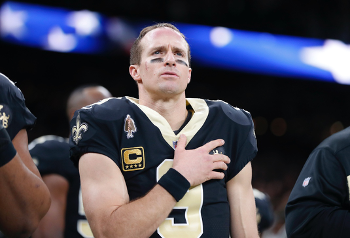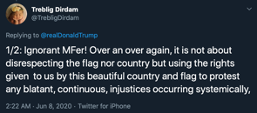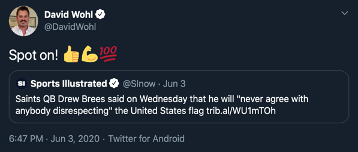
Photo of Drew Brees standing for the national anthem. (Photo by AP Photo/Gerald Herbert)
On September 1, 2016, the United States of America changed forever; two sides of a lengthy battle emerged, sparking a prevailing divide that continues to grow by the minute. To kneel, or not to kneel, that was the question, and it all stemmed from the actions of one man: Colin Kaepernick.
For many Americans, including myself, Sunday is the day where for a few hours, computers are off, textbooks are closed, and families gather around to watch 6’5, 200lb men run into each other at full speed. So, when Colin Kaepernick sparked a movement that led many football players in the National Football League to kneel out of protest for the injustices that the African American community is plagued with (i.e. police brutality, racism, discrimination, etc.), a lot of people were outraged.
People weren’t upset over the fact that these players are taking a stand, however. They were upset about the way in which these players were doing it and the fact that it was happening during our Sundays. Twitter quickly became the battlefield for a war of words between liberals and conservatives which would leave many casualties on both sides.

Photo of a tweet by a liberal fan arguing in support of the players’ right to protest the national anthem prior to the start of NFL games. (Photo taken from Twitter)

Photo of a tweet by a conservative fan arguing against the protesting of the national anthem prior to the start of NFL games. (Photo taken from Twitter)
The divide grew exponentially, with President Trump fueling the anger of liberals by saying this at a rally, “wouldn’t you love to see one of these NFL owners, when someone disrespects our flag to say, ‘get that son of a bitch off the field right now. Out. He’s fired. He’s fired.” In an interview on Yahoo Sports, quarterback for the New Orleans Saints, Drew Brees was asked about his opinion on the national anthem protests. He said,
“I will never agree with anybody disrespecting the flag of the United states of America. Let me tell you what I feel when the national anthem is played and I look at the flag of the United States. I envision my two grandfathers who fought for this country during World War II: one in the army and one in the marine corps. Both risking their lives to protect our country and to try to make our country and this world a better place. So every time I stand with my hand over my heart, looking at that flag and singing the national anthem, that’s what I think about. And in many cases it brings me to tears, thinking about all that has been sacrificed, not just those in the military, but for that matter, those throughout the civil rights movements in the 60’s, and all that has been endured by so many people up until this point. Is everything right with our country right now? No! It’s not. We still have a long way to go. But I think what you do by standing there and showing respect to the flag with your hand over your heart is it shows unity. It shows that we are all in this together, we can all do better, and that we are all part of the solution.”
Following this statement, an explosion of angry tweets and comments erupted from fans, as well as other high-profile athletes.

Photo of part I of LeBron James’s response to Drew Brees’s comments (Photo taken from Twitter)

Photo of part II of LeBron James’s response to Drew Brees’s comments. (Photo taken from Twitter)

Photo of Michael Thomas’s response to his teammate’s comments. (Photo taken from Twitter)
In a long video that another one of Brees’s teammates made, Malcolm Jenkins, tearfully said, “’I considered you a friend, I looked up to you, you’re someone I had a great deal of respect for, but sometimes you should shut the f*ck up.'” Conservatives on the other hand, like David Wohl, agreed with Brees and tweeted out in support of him.

Photo of a tweet in response to Brees’s comments by outspoken conservative David Wohl (Photo taken from Twitter)
Eventually however, “cancel culture” proved to be the stronger force, as the slander of Brees got so bad that he was forced to apologize publicly and inadvertently allow “cancel culture” to win.
So, what’s wrong with this picture? Drew Brees is the same guy who donated $5 million dollars of his own money to the State of Louisiana to help feed the homeless during the COVID-19 pandemic. He helped raise $671,000 to help restore Lusher Charter School’s athletic field, scoreboard, and track after Hurricane Katrina had left it in ruins. In October of 2009, he wrote a personal check of $39,000 to rebuild the weight room in the school as well. His countless charities and humanitarian efforts have aided the residents in New Orleans more than the politicians who were elected by the people. Troy Henry, 50, a local black businessman said, “I’ll say this: Drew is definitely an honorary brother…He transcends race, and he does it with class and dignity.”
The motivation behind the push to cancel Drew stemmed from the idea that he had spoken in support of the oppressors of African Americans in the United States. However, after reading the complete quote, it is clear that he did not do this. So why did the left paint him as a racist?
This has to do with something that Seymour Smith calls selective perception. The famous 1951 Princeton-Dartmouth football study, a study that looked into people’s memory of one of the most violent football games in college football history, was one of the numerous psychological studies done to learn more about selective perception. Researchers found that when we associate ourselves within one specific tribe, our brains tend to change our recollection of certain events to fit the ideals of the tribe that we belong to.
In other words, we see what we want to see. Liberals, out of love and support for the African American community in America, saw Brees’s comments as threatening, because as soon as he said, “I will never agree with anybody disrespecting the flag,” everything he said after was viewed as suggesting that those protesting police brutality were disrespectful. When you look at those who were indeed protesting police brutality by kneeling, you see that they were predominantly African American. Thus, via selective perception, what the left got out of Brees’s comments was that “African Americans” were “disrespectful”.
Brees’s apology would prove futile as the damage had already been done. In fact, it made things worse. Before, Brees was a hero to conservatives and a villain to liberals, but after he issued his apology, he was hated by both sides. Thus, “cancel culture” creates an environment where no matter what the aggressor does, they can never make things right once they’ve been targeted by the mob.

Photo of a tweet by David Wohl after Brees issued his apology (Photo taken from twitter)

Photo of a tweet by Booger McFarland after Brees issued his apology (Photo taken from twitter)
So, what should have happened? When humans are offended, their instinct is to attack the opposition and defend themselves. In the case of Drew Brees, his comments offended the liberal “tribe”. By collectively attacking him, it created two sides: a right and a wrong. Whenever, two sides to a conflict are created, it simplifies the conflict.
Simplicity closes off the possibility for change. It narrows the field of view to focus on a minute set of details. Complexity, on the other hand, allows people to be more open to new information. There are numerous ways to artificially introduce complexity into a situation. One way is to ask more questions that amplify contradictions between both sides. Rather than cancelling Drew, he should have been given an opportunity to explain how he feels. Some examples of questions that should’ve been asked include: “Does the flag represent liberty and the American dream, or does it represent racism? If it’s one or the other, why? Do you think the national anthem means the same thing to everyone as it does to you?” These are all questions that introduce complexity into a simplified conflict.
 NOLAbeings
Multimedia artist Claire Bangser created NOLAbeings as a portrait-based story project that marries...
NOLAbeings
Multimedia artist Claire Bangser created NOLAbeings as a portrait-based story project that marries...
 Data corner: Adobe Suite (create a PDF, social media graphic, presentation, edit a photo and video
Data corner is where you go to work with analytics and top tech skills. It takes on everything from PERL and SQL to Canva and Sprout Social.
Data corner: Adobe Suite (create a PDF, social media graphic, presentation, edit a photo and video
Data corner is where you go to work with analytics and top tech skills. It takes on everything from PERL and SQL to Canva and Sprout Social.
